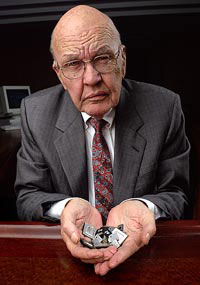
Kilby was born in Jefferson City, Missouri, in 1923. When he was still very young, the family moved to Great Bend, Kansas, where his father ran an electrical supply company. This, coupled with his father’s interest in short-wave radio, nurtured a fascination with electronics. He spent hours studying the field and putting together different gadgets. After his graduation from high school, Kilby enrolled at the University of Illinois at Urbana-Champlain and earned a bachelors degree in electrical engineering in 1947.
After his college graduation, he landed a job with an electronics manufacturer in Milwaukee, Wisconsin. Anxious to further his education while working full-time, he went to night school where he eventually earned a masters degree in electrical engineering the Milwaukee Extension of the University of Wisconsin in 1950. Three years later, he created his first invention: a plug-in circuit that helped computer engineers expand the capacity of computers. It would become the first of ten patents he would hold when approved in 1959.
Texas Instruments, a still fairly new Dallas company, was interested in his ideas on circuit miniaturization and hired him as a researcher and developer in 1958. Within a few months of his arrival, he made a revolutionary breakthrough. He helped develop the integrated circuit, a forerunner of the microchip that allows modern computers to operate. Kilby’s invention, for which he secured three patents for different parts of the design, allowed computers to perform calculations faster and for computers to start becoming smaller and cheaper. Shortly afterward, the U. S. Air Force began contracted with Texas Instruments to experiment with Kilby’s integrated circuit, which were soon being incorporated into new computer designs. Three more patents were secured as Kilby perfected the initial design. With Kilby’s breakthrough, engineers raced to top one another to make circuit designs smaller, faster, and more efficient.
In 1965, Kilby and his team invented the thermal printer, using heat for printing with industrial devices instead of the cumbersome mechanical keys used in typewriters for decades by this point. This allowed for increased speed and efficiency and fewer mechanical problems. It was soon being used in the new computers that Texas Instruments was producing.
By 1967, one of the earliest practical applications of the integrated circuit was developed by Kilby for the general public, the handheld electronic calculator. Homes and businesses across the nation were transformed as it became an essential device for everything from household budgets to schoolwork. The patent for this invention was granted in 1974.
From 1978 to 1984, he served as a distinguished professor of electrical engineering at Texas A&M University. Kilby formally retired from Texas Instruments in 1983, just as the computer revolution he had helped inaugurate was getting underway. As the world embraced computers in the 1980s, an increasing number of the new generation of designers, engineers, and programmers pointed to the importance of Kilby's work in making new computer technology possible. He often spoke to colleges and businesses around the world in his retirement years.
In 2000, he received the highest honor in science for his lifetime of achievement when he was awarded the Nobel Prize in Physics, sharing the award with Z. I. Alferov of Russia and Herbert Kroemer of Germany, who had also made major breakthroughs in semiconductor research. The mild-mannered engineer for TI was now recognized as one of history's most brilliant minds. Kilby died in Dallas in 2005 at age 82.

